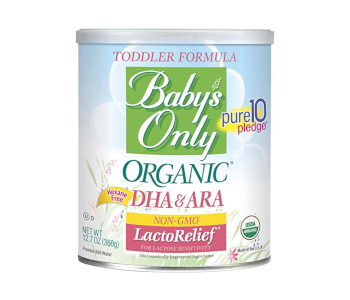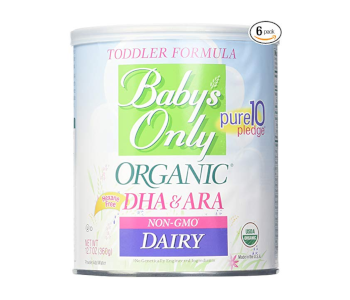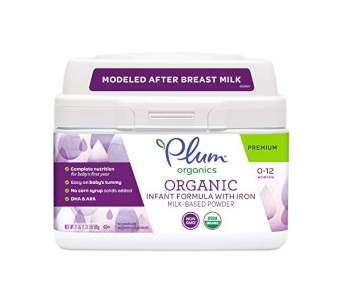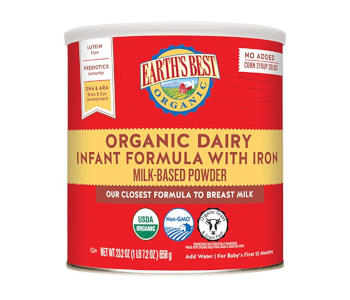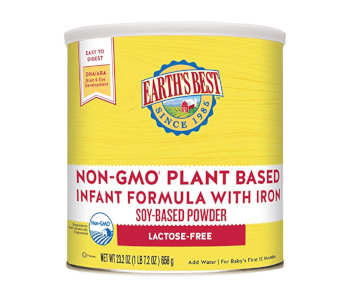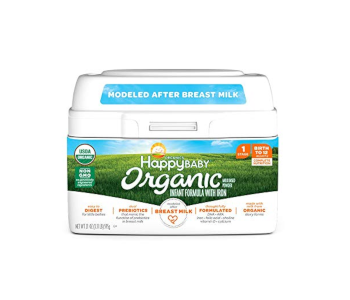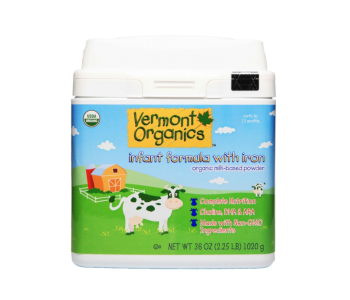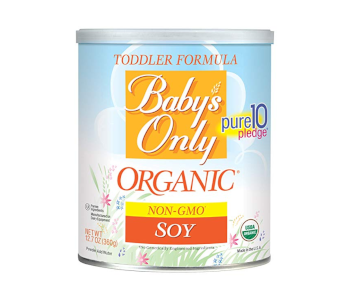Deciding to formula feed your child can be a difficult decision. Breastfeeding isn’t an option for everyone, but parents still want to provide the best for their child. Rest assured, baby formula has everything necessary for your baby to grow and thrive. Picking a formula that is easy for your baby to digest and provides all of the nutrients necessary is important, and many parents find that they prefer one of the options for the best organic baby formula.
| BRAND | Protein Base |
| Baby’s Only Organic LactoRelief Formula | Milk Based with Lactose Altered | Baby’s Only Organic Formula | Milk Based | Plum Organics Organic Infant Formula | Milk Based | Earth’s Best Organic Infant Formula | Milk Based | Earth’s Best Organic Soy Formula | Soy Based | Happy Baby Organic Infant Formula | Milk Based | Vermont Organics Infant Formula | Milk Based | Baby’s Only Soy Organic Formula | Soy Based |
Organic Baby Formula: What’s the Deal?
Baby formula typically comes from cow’s milk, but companies also use soy or protein hydrolysate as the basis for babies with allergies. The goal is to create a formula that resembles breast milk as closely as possible. Vitamins and minerals are added as well and processed into the formula to help your infant digest it and provide all the necessary nutrients to grow.
You might feel leery about picking a formula, but you should know that all baby formulas are regulated by the FDA. All companies must meet certain safety standards and provide a set minimum amount of nutrients necessary for your baby to grow and develop appropriately.
So, what’s the deal with organic formula? Well, organic baby formula offers the same nutrients and health benefits as a conventional formula. The main difference is that, in order to have the organic label, the ingredients may not have any exposure to pesticides. Some parents believe that pesticide residue leads to gastrointestinal problems in children, and many parents worry about lasting effects caused by exposure to these chemicals.
3 Forms of Organic Formula
Compared to breastfeeding, formula feeding offers parents several different options when it comes to forms of milk. You can try different varieties to see what works better for your child.
As you shop for organic formula, there are three forms that you’ll find: ready-to-use, powdered, and liquid concentrate.
- Ready to Use
Do you want something that requires no prep work? If you just want to open and go, ready to use formula is the pick for you. Most hospitals provide this variety when your baby is born. It’s an ideal choice if the water in your area is iffy.There are two drawbacks to ready to use formula. First, it tends to be more expensive than other picks. Second, it has a shorter shelf life. Babies need to drink the formula within 48 hours or it’ll spoil.
- Liquid Concentrate
When it comes to price, liquid concentrate is between powdered and ready to use. You still have to make the formula, but that involves mixing water and liquid concentrate in equal portions. The only true benefit is that some parents find it easier and faster to make.You still have to make the formula, so you don’t get out of making it. It’s more expensive than powdered, but it might be your thing, and that’s okay too!
- Powdered
Powdered formula is the most popular pick and the one you probably are most familiar. It is the most cost-effective option, so if you want to save money, steer towards the powdered formula. The canisters have a moderately good shelf-life, so you can stock up without worry.
The only downside to powdered formula is that you have to prepare the formula, and that can really stink in the middle of the night when you’re already a zombie.
The 4 Types of Organic Formula
Some babies do better on specific types of formula. If your child has a sensitivity, you have to learn how to read the labels on the formula to understand the ingredients. There are four different main ingredients you’ll find in formulas. Let’s take a look!
- Cow’s Milk
Most formulas are cow’s milk based. It’s a great pick because companies alter the protein to make it easy for babies to digest. Organic cow’s milk-based formula uses milk from cows who never were exposed to pesticides. - Soy Milk
If your baby is unable to process dairy, soy-based formulas are a great option. The plant protein is altered to make it easy to digest with the right amount of nutrients for your baby. An organic soy-based formula uses plants that are chemical and pesticide-free. - Lactose-Free
Babies who are lactose intolerant may need lactose-free milk. Lactose intolerance isn’t a common problem, and there is a good chance your baby will outgrow it even if he is diagnosed with it as a child. Many parents struggle with the idea of giving lactose-free formula because the main ingredient is typically corn syrup. Speak to your pediatrician before using this type of formula. - Hydrolyzed Formula
For babies that have extensive health issues or allergies, your pediatrician may recommend that your infant drinks hydrolyzed formula. In layman terms, formula companies break down the protein in milk to the smallest possible, making it easier for your baby to digest. In the United States, most, if not all, organic infant formulas are made with intact (large) proteins, so you really won’t be able to find an option for organic hydrolyzed formula.
How to Pick the Best Organic Formula
Every baby is different, so you should keep your sweet baby in mind when making a selection. Some babies do great with prebiotics, but others develop too much gas. Some do better with less lactose. The list goes on and on, and some parents find that they have to try a few options to get the right one. It’s impossible to pick just one as the absolute best.
That doesn’t mean there won’t be the best organic formula for your baby. Let’s look at how you will pick the one for your baby.
- The Protein Source
First, you have to decide what protein type to use. The most common choices are soy or cow’s milk based, but we covered all four types above.Cow’s milk-based have two categories: whey and casein. Most formulas start with a base of nonfat cow’s milk which uses mostly casein with a bit of whey. Then, they added extra whey to make it more similar to breastmilk.
- The Carb Source
Next, you have to decide what will be your carb source. Breast milk contains only lactose along with a bunch of yummy goodness that helps your baby digest that lactose. Some babies need a lactose-reduced formula because their bellies struggle to process all of that lactose.There are several options for carbohydrates in a formula, such as:
- Brown rice syrup
- Sugar
- Sucrose
- Glucose syrup solids
- Corn syrup
- Corn syrup solids
- maltodextrin
- The Fat Source
The last ingredient that you need to consider is the fat source. All fats in organic formulas come from different oils. There isn’t a huge variation between brands, but some brands do opt to exclude palm oil from their blends. Palm oil is a bit controversial. It’s best if you do some research to decide if it would be right for your baby.
Top Picks for the Best Organic Baby Formula
1. Baby’s Only Organic LactoRelief Formula
For babies who struggle with digesting dairy, Baby’s Only Organic LactoRelief is a fantastic choice. It is one of the only lactose-free formulas that are also organic and kosher with high levels of essential fatty acids. Baby’s Only created this formula for babies who are lactose sensitive, but the parents want to avoid soy protein. The formula is milk-based but the lactose is reduced by using a special enzyme process.
We love that it contains no corn syrup or genetically modified ingredients. Instead, Baby’s Only uses naturally-sourced vitamins, like vitamin E acetate, and uses brown rice syrup instead of corn syrup. Don’t be alarmed by the fact that the label says “Toddler Formula.” Baby’s Only states that they do so because they suggest breastfeeding for babies under 1 year old.
However, if you are concerned, make sure you bring it to your pediatrician’s office to guarantee that it contains all of the necessary ingredients for your infant child.
| The Pros |
|---|
| Kosher |
| Lactose-Free |
| No Corn Syrup |
| GMO-Free |
| The Cons |
|---|
| May cause mild constipation |
| Might Not Be Ideal for Your Newborn |
2. Baby’s Only Organic Formula
Our next pick is also by Baby’s Only, and it’s quite similar to their LactoRelief option. The main difference is that it’s not for sensitive babies, so it contains regular lactose levels. However, it uses naturally sourced vitamins, rather than petroleum-based ones. Also, Baby’s Only uses brown rice syrup rather than corn syrup solids.
We like that Baby’s Only uses natural sources for their DHA and ARA, both of which increase brain development. The DHA is sourced from eggs yolk instead of using any harmful processes. Using egg phospholipids makes the formula easier to digest. Baby’s Only is made in the USA by a family-owned business, and they also don’t use any palm oil in their products. Parents really do rave about their formula!
Once again, we know that Baby’s Only says “Toddler Formula,” but the nutrients included are exactly what your infant needs. It contains high levels of milk protein casein rather than whey. It should be suitable for newborns!
However, some babies do struggle with the high levels of lactose in this formula. If that sounds like your baby, try the Whey formula that Baby’s Only creates.
| The Pros |
|---|
| Milk-Based |
| Uses Brown Rice Syrup |
| Naturally Sourced AHA & ARA |
| Made in the USA |
| The Cons |
|---|
| Brown Rice Syrup is the First Ingredient. |
| Contains Nucleotides |
3. Plum Organics Organic Infant Formula
Plum Organics is a good pick because it’s available in most grocery stores in the United States. First, we have to point out that there are no corn syrup solids in this baby formula. Plum Organics used lactose from cow’s milk to provide the sweetness to make it more appealing to your baby. Lactose comes in abundance throughout breast milk, so this was a wise choice by Plum Organics
We like that this organic baby formula is kosher dairy, gluten-free, and contains no genetically modified ingredients. Plum Organics used a blend of organic lactose, nonfat milk, oils (coconut, soy, and palm), and whey protein, along with an abundance of vitamins, amino acids, minerals, and omegas to ensure your baby receives all of the necessary nutrients.
Plum Organics also includes DHA and ARA to promote your child’s development. Your baby will receive appropriate levels of folic acid, choline, calcium, and vitamins D, E, and K. This formula is meant for infants, but it’s not ideal for premature babies.
One thing to consider is that the ingredients do contain palm oil, and some studies show that palm oil leads to decreased bone density because it decreases the calcium and fat absorption by the baby. So, if you are considering Plum Organics, it’s best to speak to your pediatrician if you have concerns!
| The Pros |
|---|
| Kosher Dairy |
| Gluten-Free |
| Uses Lactose as Sweetener |
| Contains DHA & ARA |
| The Cons |
|---|
| Contains palm oil |
4. Earth’s Best Organic Infant Formula
We have to include Earth’s Best in the list because it is the original organic and kosher baby formula and the most widely distributed. The formula contains DHA and ARA for brain and eye development. Earth’s Best sources milk from cows that receive no growth hormones, antibiotics, or steroids. Also, their feed never contains pesticides or herbicides.
Earth’s Best is a great pick for many families. It’s affordable, especially when compared to other choices, and most babies have an easy time digesting it. You can find it in most grocery stores, so you don’t have to buy it online unless you prefer buying it in bulk.
So, why isn’t Earth’s Best higher on the list? Some parents don’t like that they used added syrup solids, and they source their DHA and ARA sourced from lab-grown algae and fungus using hexane. Hexane is a bit controversial because it’s a solvent used as a chemical degreaser. So, parents have to weigh the pros and cons!
| The Pros |
|---|
| Milk-Based |
| Contains DHA and ARA |
| Affordable |
| Available in Most Grocery Stores |
| The Cons |
|---|
| Has Corn Syrup Solids |
| Uses Hexane |
5. Earth’s Best Organic Soy Formula
Earth’s Best makes one of the only organic soy formulas on the market, and it’s a top-notch example. It has a similar profile to that of breast milk, but the protein use is soy rather than lactose. Earth’s Best formulated it so it’s easy to digest. The formula is enhanced with DHA and ARA.
It contains iron and other nutrients, meeting all the FDA requirements for infant nutrition with a high-quality protein, carbohydrates, vitamins, minerals, and essential fatty acids. The bonus is that you don’t have to worry about any growth hormones, antibiotics, steroids, fertilizers, or pesticides damaging your baby. If you need a soy-based formula, Earth’s Best is a great choice for a non-GMO, kosher, soy-based, organic formula.
| The Pros |
|---|
| Certified USDA Organic and Kosher |
| Similar to Breast Milk |
| Lactose-Free |
| No Artificial Ingredients |
| The Cons |
|---|
| Uses Corn Syrup |
6. Happy Baby Organic Infant Formula
Happy Baby is a well-known baby brand that makes organic baby food, snacks, and formula. They offer an organic, non-GMO formula that doesn’t contain any corn syrup solids or other sweeteners. The ingredients are rather simple, including lactose, milk, several oils (such as palm, soy, coconut, and sunflower), whey protein concentrate, soy lecithin, essential fatty acids, and prebiotics.
The formula contains DHA and ARA, as well as the other important vitamins and minerals necessary for proper growth. Your baby will receive iron, zinc, choline, vitamin D, and calcium. We like that this formula is kosher, and the dairy cows were only fed organic diets.
Unlike other formulas, the composition of this formula is rather similar to breastmilk. Babies receive around 100 calories, 2 grams of protein, and 5 grams of fat for each serving. The main difference is that it doesn’t have the sweetness when compared to breastmilk. Plus, it doesn’t contain too much iron, so your baby shouldn’t struggle with constipation.
We only noted a few minor negatives. Some parents struggle to get it to fully dissolve in water without any clumps. Also, it does contain palm oil and soy, both of which are controversial amongst parents.
| The Pros |
|---|
| Non-GMO |
| Gluten-Free |
| Uses Only Lactose |
| Includes Two Different Prebiotics |
| The Cons |
|---|
| Expensive |
| Difficult to Dissolve |
7. Vermont Organics Infant Formula
Vermont Organics is a great pick for the best organic baby formula. It doesn’t contain any growth hormones, antibiotics, steroids, pesticides, or herbicides. That’s awesome and exactly what parents want! The formula contains DHA and ARA for proper brain and eye development, as well as lutein and vitamin E. Lutein is naturally found in breast milk and believed to support eye health.
We love that Vermont Organics is manufactured in Vermont and Ohio. Made in the USA products are awesome! They source their dairy from markets throughout the United States, Canada, and New Zealand. Parents love that it mixes much easier than other formulas and corn syrup is NOT the first ingredient like so many other picks!
Unfortunately, Vermont Organics sources their DHA and ARA from algae and fungi using hexane extraction, which is controversial as well. Despite the way that they labeled the ingredients, the formula does contain corn syrup solids. Instead, they labeled it as glucose syrup solids to try to make it look nicer.
| The Pros |
|---|
| Contains DHA & ARA |
| Has Lutein for Eye Health |
| Made in the USA |
| Mixes Easily |
| The Cons |
|---|
| Slight fishy odor |
| Contains Syrup Solids |
8. Baby’s Only Soy Organic Formula
If you want another pick for an organic soy-based formula, Baby’s Only is for you. Baby’s Only has made our list three times, so most of the things discussed above apply here as well. There are a few differences. This formula is best for babies who have a dairy allergy, including galactosemia or for families who prefer a vegetarian diet.
First, Baby’s Only Soy doesn’t contain DHA or ARA, which is a disadvantage to many parents. However, it’s an affordable choice that provides all of the vital nutrients necessary for proper growth. Truth be told, it’s one of the most cost-effective soy formulas out there that is still nutritionally sound.
We love that this soy formula uses GMO-free soy, and it doesn’t contain any corn syrup, palm oil, or hexane-processed DHA. Those are all awesome features! If you are on a budget but your baby needs soy and you prefer organic, Baby’s Only Soy should be your choice!
| The Pros |
|---|
| Affordable Option |
| Provides All Necessary Nutrients |
| Perfect for Dairy Allergy |
| GMO-Free |
| No Corn Syrup or Palm Oil |
| The Cons |
|---|
| Doesn’t Contain DHA or ARA |
| Not Available in Grocery Stores |
Final Words about Organic Baby Formula
One thing is for sure – parents need more options for organic baby formulas. There aren’t too many awesome organic formulas that are also safe for newborns. Once you start reading ingredients, you realize that companies use questionable ingredients, like petroleum-sourced vitamins.
However, these choices for the best organic baby formula are all awesome! You have to decide how you feel about controversial ingredients. A few of the options on our list are free of anything that parents might seem unsafe, but many of them aren’t available at the grocery store. So, decide what features matter the most for you in a formula and see if your baby enjoys it as much as you hope!

